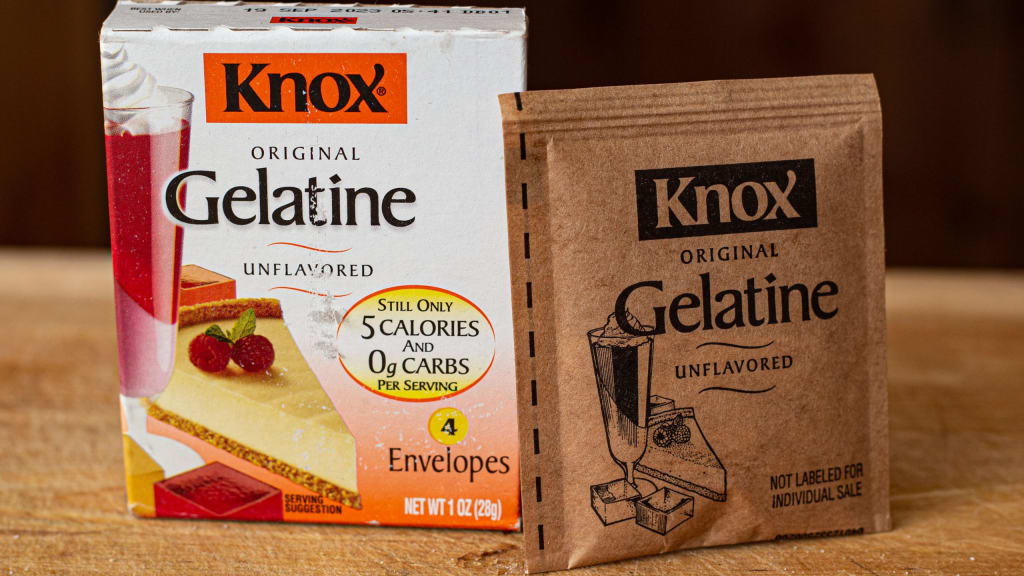Unveiling the Halal Status of Gelatin
What You Need to Know

In the modern food industry, gelatin is a widely used ingredient known for its unique gelling properties. However, for individuals who adhere to halal dietary guidelines, determining the halal status of gelatin can be a complex task. Gelatin is derived from animal sources, and its production process raises questions about its compliance with Islamic dietary laws. In this article, we will delve into the world of gelatin, explore the factors that determine its halal status, and provide useful insights for Muslims seeking to make informed choices regarding the consumption of halal gelatin.
Understanding Gelatin
Gelatin is a protein substance that is obtained from the collagen found in the connective tissues, skin, and bones of animals. It is commonly derived from sources such as bovine (cattle) and porcine (pig) origin, although gelatin can also be obtained from other animals like fish and poultry. The production process involves extracting collagen from the animal tissues, followed by purification and dehydration, resulting in the formation of gelatin.
Halal Certification Process
Determining the halal status of gelatin involves considering the source of the animal and the method of slaughter. Halal certification organizations have specific criteria that must be met for gelatin to be considered halal.
Animal Source: Gelatin derived from permissible animals, such as cattle or fish, is generally considered halal. However, gelatin obtained from prohibited animals, such as pigs, would be considered haram (forbidden) for Muslims.
Slaughter Method: For gelatin to be halal, the animal from which it is derived must be slaughtered according to Islamic guidelines. The animal should be slaughtered by a Muslim who is skilled in the proper method of halal slaughter (known as dhabiha), which involves swiftly cutting the throat and severing the major blood vessels while invoking the name of Allah.
Halal Certification Organizations
To address the concerns of Muslim consumers, various halal certification organizations around the world provide guidelines and certification for gelatin manufacturers. These organizations inspect the entire gelatin production process, ensuring that it complies with halal standards. Some well-known halal certification organizations include the Islamic Food and Nutrition Council of America (IFANCA), the Halal Food Authority (HFA), and the Halal Certification Services (HCS).
Reading Labels and Seeking Halal Gelatin
When purchasing products containing gelatin, it is important for Muslims to read the labels carefully. Look for clear indications of halal certification or symbols provided by reputable halal certification organizations. Additionally, some manufacturers explicitly mention the source of gelatin on their labels, allowing consumers to make informed decisions about the halal status of the product.
Alternatives to Gelatin
For individuals who prefer to avoid gelatin altogether, there are alternatives available. Some plant-based alternatives, such as agar-agar, carrageenan, and pectin, can be used as substitutes for gelatin in certain recipes. These alternatives provide similar functionalities without the use of animal-derived ingredients.
Conclusion
the question of whether gelatin is halal or haram requires a thorough understanding of its source, the method of slaughter, and the certification process. Gelatin derived from permissible animals, such as cattle or fish, and obtained through halal slaughter methods can be considered halal. On the other hand, gelatin sourced from prohibited animals, such as pigs, would be considered haram for Muslims.
To ensure the halal status of gelatin, it is crucial for Muslims to seek products that carry reputable halal certification from recognized organizations. These certification bodies rigorously inspect the entire gelatin production process, ensuring compliance with Islamic dietary laws. By reading labels and looking for clear indications of halal certification or symbols provided by trusted organizations, Muslim consumers can make informed choices regarding the consumption of halal gelatin.
For individuals who prefer to avoid gelatin altogether, there are plant-based alternatives available that offer similar functionalities in recipes. Plant-based options like agar-agar, carrageenan, and pectin provide viable substitutes without the use of animal-derived ingredients.
Unveiling the halal status of gelatin allows Muslims to make conscious decisions in accordance with their dietary requirements and religious beliefs. By staying informed, reading labels, seeking halal-certified products, and exploring suitable alternatives, individuals can navigate the complex landscape of gelatin products while upholding their commitment to a halal lifestyle. Ultimately, this knowledge empowers Muslims to make choices that align with their values, promoting a sense of confidence and peace of mind in their consumption practices.





Comments
There are no comments for this story
Be the first to respond and start the conversation.